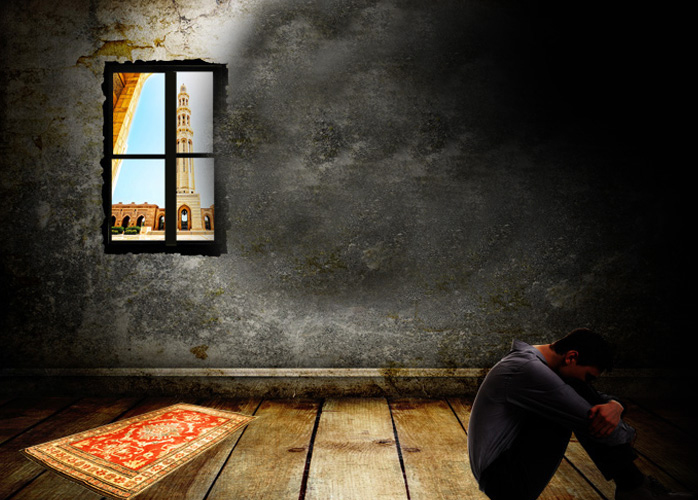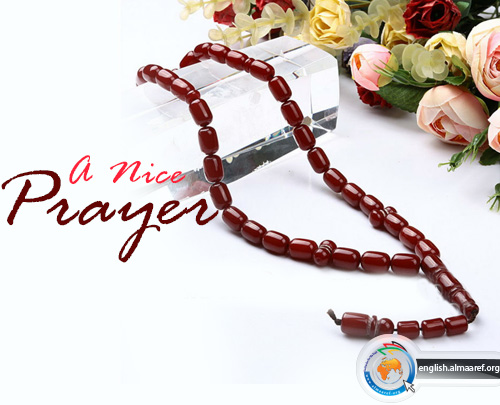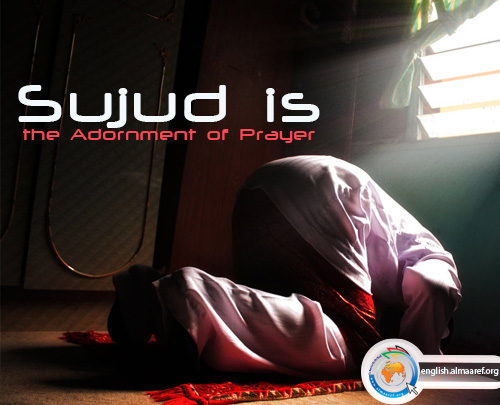The Most High God says on the tongue of Wise Luqman,
﴾O my son! Establish regular prayer…
﴿1 Also, The Most High God says,
﴾Speak to my servants who have believed, that they may establish
regular prayers, and spend (in charity) out of the sustenance We have given
them, secretly and openly, before the coming of a Day on which there will be
neither mutual bargaining nor befriending﴿2
The Importance of the Prayer and Its Role in Life
The Most High God says,
﴾…and establish regular prayer: for prayer restrains from shameful and
unjust deeds; and remembrance of God is the greatest (thing in life) without
doubt. And God knows the (deeds) that ye do﴿3
It is related that God’s prophet (God’s prayers and peace bestowed upon him and
his Household) said, “The prayer is the base column of religion. Once it is
accepted, everything else is accepted. And once it is rejected, everything else
is rejected.”4
The word “prayer” [salat] is derived from connection [sila]. That the person be
a performer of prayer means that he is connecting with The Most High God. The
prayer, therefore, represents the connection point between the servant and his
Creator.
It is by means of the prayer that the servant calls his God; shows to Him
submission and acknowledgment of His Godhood and his own slavery to Him; repeats
the allegiance with the absolute obedience to The Most Glorified God; refuses to
turn towards and to submit to anybody rather than God; and refuses to obey
anybody rather than God.
It is related that Imam Ali bin Musa Al-Rida (God’s peace bestowed upon him)
said, “The cause of prayer lies in that it is an acknowledgment of the
godhood of The Most Glorious and Reverent God; a rejection of any peers; a
standing before The Most Reverent Almighty in an act of humiliation, misery,
submission, and confession; an asking for forgiveness of sins; a putting of the
face five times a day on the ground in an act of glorification of The Moat
Glorified and Reverent God.
It is by means of the prayer that one be remembering God i.e. neither forgetful
nor ungrateful; be pious, humiliated, yearning, asking for more in religion and
in this life; and be day and night restraining himself and continuously
extolling The Most Glorious and Reverent God, so that the servant will not
forget his Lord and Manager and Creator, and thus will not turn to be an
arrogant and a tyrant, and so that he will be, in his extolment of God and
standing before Him, restrained from the sins and prevented from the sorts of
corruption.”5
The Prayer Is a Continuous Purification from Sins
Because of the human being’s presence in the abode of test and affliction [i.e.
this life], he commits sins. Consequently, his heart gets polluted and occupied
with this life, thus becoming inadvertent of the remembrance of God and of the
prayer. In this context, one poet said,
Satan, this life, my soul, and the fancy
How to attain salvation with each being my enemy
Still, God, due to His Mercy, provided the human being with a means, so that he
will get continuously purified from his sin; this means is the prayer. The Most
High God says,
﴾The believers must (eventually) win through * Those who humble
themselves in their prayers﴿6
It is related in a discourse ascribed to God’s prophet (God’s prayers and peace
bestowed upon him and his Household) that he said, “If there is at the door
of one of you a river from which he washes five times a day, will there any dirt
remain on his body?” We [those present] answered, “No.” Then, he said, “The
prayer is like the flowing river: At each time one performs a prayer, it will
wash the sins between one prayer and the next one.”7
It is related that The Prince of the Believers (God’s peace bestowed upon him)
used to recommend his companions with: “Commit to the prayer. Keep it.
Perform it abundantly. Get close [to God] by means of it, for it is enjoined on
the believers at stated times. Do not you hear the answer of the people of the
fire when they will be asked, ‘What led you into Hell?’
They will answer, ‘We were not from among those performing the prayer.’ It rubs
the sins as the paper is rubbed and releases them as the slaves are rubbed.
God’s prophet (God’s prayers and peace bestowed upon him and his Household)
resembled it to the hot fountain which cures from all diseases and which is at
the door of man from which he washes five times a day and night; then what dirt
will remain on him? And its due was known by believing men who neither the
worldly decoration nor the pleasure nor the child nor the money occupies them
from. The Most Glorified God says,
﴾By men whom neither traffic nor merchandise can divert from the
Remembrance of God, nor from regular prayer, nor from the practice of regular
charity8?﴿9
Underestimating the Prayer
Underestimating the prayer results necessarily in the deprivation from the
Divine Kindness because the one underestimating the prayer is in fact belittling
the greatest duty between him and God. From here, a grave dispraise of those
belittling the prayer is mentioned in the Book and in the Prophetic norm. The
Most High God says,
﴾So woe to the worshippers * Who are neglectful of their prayers﴿10
It is related that Imam Abou Jaafar Al-Baqer (God’s peace bestowed upon him)
said, “Do not belittle your prayer, for The Prophet (God’s prayers and peace
bestowed upon him and his Household) said at his death, ‘He who underestimates
his prayer does not belong to me. He who drinks an alcoholic drink does not
belong to me: He will not come to me at the Pond.’”11
From the signs of underestimating and belittling the prayer is when the servant
quickly performs it without having his heart present and without thinking about
its meanings and about Whom he is standing before.
It is related that Zarara related that Abou Jaafar (God’s peace bestowed upon
him) said, “Once when God’s prophet (God’s prayers and peace bestowed upon
him and his Household) was sitting in the mosque, one man entered and started
praying without elaborating neither his bowing nor his prostration. So he (God’s
prayers and peace bestowed upon him and his Household) said, ‘It is like the
peck of the crow. If this man dies and such is his prayer, he will not be
belonging to my religion when he dies.’”12
The Prayer Is the First Point about Which the Servant Will Be Asked
It is related that Abou Abdullah (God’s peace bestowed upon him) said that God’s
prophet (God’s prayers and peace bestowed upon him and his Household) said,
“He who performs the prayer not at its proper time will have it raised for him
black, dark, and saying, ‘You wasted me. May God waste you as you did waste me.’
And the first point about which the servant will be asked when he will stand
before The Most High God is the prayer. If it is purified, all the rest of his
work will be purified. Yet, if it is not purified, his work will not be
purified.”13
It is related in a discourse ascribed to Imam Al-Sadik (God’s peace bestowed
upon him) that he said, “The first point for which the servant will be
accounted is the prayer: If it is accepted, all the rest of his work will be
accepted. But if it is rejected, all the rest of his work will be rejected.”14
How Must We turn towards God in the Prayer?
What is important is not to perform a lot of prayers or to perform them
lengthily; it is to stick to them and to perform them with serenity,
contemplation, and presence of the heart.
It is related that Imam Al-Sadik (God’s peace bestowed upon him) said, “When
you perform a dutiful prayer, perform it at its time the prayer of the one
bidding farewell to this world and fearing not to come back. Then turn your
sight towards the spot of your prostration. When you know who is to your right
and to your left, you will elaborately perform the prayer. Bear in mind that you
are before Who sees you and Whom you do not see.”15
The Etiquettes of the Prayer
When praying, there is a group of etiquettes which one must consider.
1* One should not belittle the prayer, and one should take care of the
purification and the cleanliness.
2* One should perform the prayer of the last moment i.e. the prayer of the one
bidding farewell to this world.
3* One should know in front of Whom he is standing, Whom he is praying to, and
Whom he is soliloquizing.
4* One should have his heart present i.e. being pious, submissive, and feeling
poverty and weakness before The Most High God.
5* One should be sincere in the intention and in the work because the servant
will have nothing from his prayer save the part which he turned to God in.
6* One should have the prayer prior to all the other issues of this world.
7* One should care for the group prayer.
8* One should follow up the prayer with the glorification of Al-Zahraa (God’s
peace bestowed upon her) and with what is ascribed to the Household (God’s peace
bestowed upon them).
9* One should perform the prayer in the mosque, for it is related in The
Prophet’s (God’s prayers and peace bestowed upon him and his Household)
recommendation to Abou Thar (May God be pleased with him), “O Abou Thar!
Every believer moving to the prayer will have the grace, as much as there is
between him and the Throne, scattered over him, and will have an angel entrusted
with him calling, ‘O Son of Adam! If you know what you get from your prayer and
Whom you are soliloquizing, you will not get bored and will not turn aside…’ O
Abou Thar! Blessed be the carriers of the Banners on the Day of Judgment: They
will carry them and will forgo the people to heaven… They are those forgoing to
the mosques in the early dawns and in other times.”16
Preventions from the Acceptance of the prayer
There are many causes preventing the acceptance of the prayer, among which we
are going to mention the following:
1- Filial Disobedience: It is related that Imam Al-Sadik (God’s peace
bestowed upon him) said, “God will not accept the prayer of him who looks at
his parents with hatred even if they are unjust with him.”17
2- Backbiting: It is related that The Prophet (God’s prayers and peace
bestowed upon him and his Household) said, “He who backbites a male or a
female Muslim will have God not accepting his prayer and fasting for forty days
and nights unless the one backbitten forgives him.”18
3- Underestimating the Prayer: It is related that The Prophet (God’s
prayers and peace bestowed upon him and his Household) said, “The thief is
not the one who robs the people but the one who robs the prayer.”19
The Love of the Prayer
Once the servant knows the value and the prestige of the prayer with The Most
High God, he gets attached to it and loves it because in his prayer he is close
to The Most High God; such is the state of the elites and the authorities. It is
related in a narrative ascribed to The Prophet (God’s prayers and peace bestowed
upon him and his Household) that he said, “O Abou Thar! The Most High God
made the prayer the apple of my eye and endeared it to me as He endeared the
food to the hungry one and the water to the thirsty one. However, the hungry
gets satisfied when he eats food, and the thirsty gets quenched when he drinks
water; but I am never satisfied with the prayer.”20
For Reading
It is related that Oubayd bin Zarara said,
I asked Abou Abdullah (God’s peace bestowed upon him) about the great sins. He
answered, “They are, in Ali’s (God’s peace bestowed upon him) book, seven:
denying God; killing the soul; filial disobedience; taking the usury after
having known it to be so; oppressingly taking the property of the orphan; escape
from the fight for God’s sake; and urbanization after the immigration.”
I asked, “Are these the greatest sins?” He (God’s peace bestowed upon him)
answered, “Yes.” I asked, “Which is greater: oppressingly taking one dirham from
the property of the orphan or abandoning the prayer?” He (God’s peace bestowed
upon him) answered, “It is the abandoning of the prayer.”
I said, “Yet you did not list the abandoning of the prayer among the great
sins.” He asked, “What is the first point which I mentioned to you?” I answered,
“It is the denial of God.” He (God’s peace bestowed upon him) said, “The one
abandoning the prayer is an atheist i.e. abandoning it without an excuse.”
1- The Noble Qur'an/
Luqman Chapter/ Verse 17
2- The Noble Qur'an/ Ibrahim Chapter/ Verse 31
3- The Noble Qur'an/ Al-Ankabut [The Spider] Chapter/ Verse 45
4- Nahej Al-Sa’ada [The Path of Happiness]/ Part Four/ Page 140
5- Yanabeeaa Al-Hekma [The Fountains of Wisdom]/ Part Three/ Page 492
6- The Noble Qur'an/ Al-Mo’minoun [The Believers] Chapter/ Verses 2 and 3
7- Wasael Al-Sheeaa [The Means of the Shiite]/ Part Four/ Page 12
8- The Noble Qur'an/ Al-Nour [The Light] Chapter/ Verse 37
9- Nahej Al-Balagha [The Path of Eloquence]/ Part Two/ Page 178
10- The Noble Qur'an/ Al-Ma’oun [The Small Kindnesses]/ Verses 4 and 5
11- Wasael Al-Sheeaa [The Means of the Shiite]/ Part Four/ Page 24
12- Wasael Al-Sheeaa/ Part Four/ Page 32
13- Yanabeeaa Al-Hekma [The Standard of Wisdom]/ Part Three/ Page 496
14- Yanabeeaa Al-Hekma/ Part Three/ Page 495
15- Mustadrak Al-Wasael [Making up for the Means]/ Part Three/ Page 433
16- Wasael Al-Sheeaa [The Means of the Shiite]/ Part Four/ Page 34
17- Bihar Al-Anwar [The Seas of Lights]/ Part Seventy One/ Page 61
18- Bihar Al-Anwar/ Part Seventy Two/ Page 258
19- Bihar Al-Anwar/ Part Eighty One/ Page 267
20- Al-Amali/ Al-Toussi/ Page 528




















